|
|
|
|
|
|
|
|
|
No Arctic-science events are scheduled for today.
|
Media
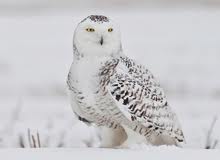 Snowy Owl Invasion: Is the Arctic No Longer Arctic Enough? Snowy Owl Invasion: Is the Arctic No Longer Arctic Enough? Snowy owls have again flown south in large numbers to Eastern Ontario, and now birders are starting to think of this previously rare pattern as the new normal for the Arctic birds. They're also coming up with a theory: The owls are being driven south not because the Arctic is too harsh, but because it is no longer harsh enough. In an odd way, this may make life harder for owls in the North. The Montreal Gazette
Coast Guard's Much Needed Icebreaker Could Take at Least 6 Years. A badly needed, new icebreaker for the Coast Guard is at least six years from being commissioned, assuming Congress can come up with the money to build it, Coast Guard Commandant Adm. Karl Schultz said. Even then, the heavy icebreaker that would replace the 42-year-old Polar Star would have the primary mission of busting ice at the South Pole, rather than patrolling the Arctic, where Russia and China aggressively have been making inroads, Schultz said during several appearances in December in Washington, D.C., aiming to rally support for the Coast Guard's budget and readiness initiatives. Military.com
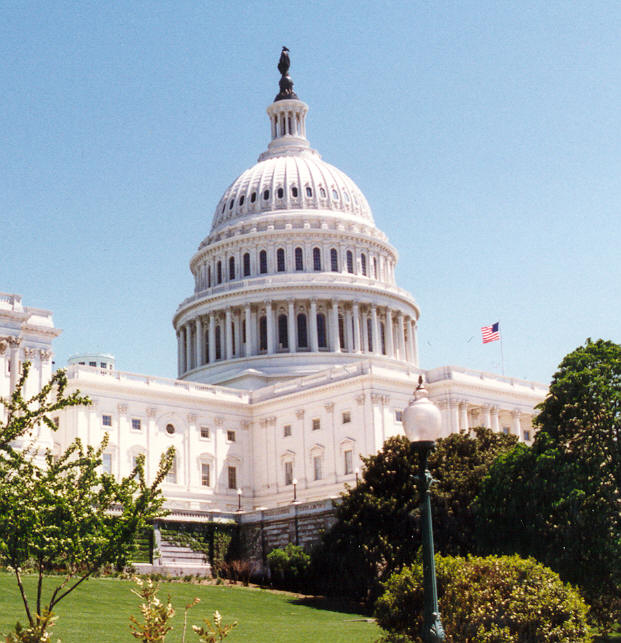 Coast Guard Polar Security Cutter Funding Frozen by Capitol Hill Budget Negotiations. Coast Guard Polar Security Cutter Funding Frozen by Capitol Hill Budget Negotiations. The U.S. Coast Guard's funding for a polar icebreaker is set to be postponed yet again, after Congress and President Donald Trump again failed to reach an agreement on Fiscal Year 2019 funding for the Department of Homeland Security and the Senate today began work on passing another short-term continuing resolution. Despite multiple delays to the DHS budget - and the $750-million icebreaker request to get the shipbuilding program started this year - a Homeland Security budget expert says he is confident the Coast Guard will ultimately be able to start the icebreaker program without any lasting damage due to widespread support for the icebreaker and Arctic activities in general on Capitol Hill. USNI News
|
|
Future Events
'UK-US Maritime, Aerospace and Security Cooperation in the Arctic'. Delegates will discuss and debate trade and security-focused Arctic collaboration in the Arctic between US, the UK, and their allies. This convening is designed to deepen the UK-US special relationship by strengthening trade and cooperation in four areas in particular: maritime services, aerospace, fisheries, defense and security. The Arctic Encounter London is co-produced by the Polar Research and Policy Initiative and the Arctic Encounter. The Polar Research and Policy Initiative (PRPI) is a London-based international think-tank dedicated to Arctic, Nordic, North Atlantic, North Pacific and Antarctic affairs. The Arctic Encounter is the largest annual Arctic policy and business conference convening in the United States, with partnerships and convening efforts worldwide.
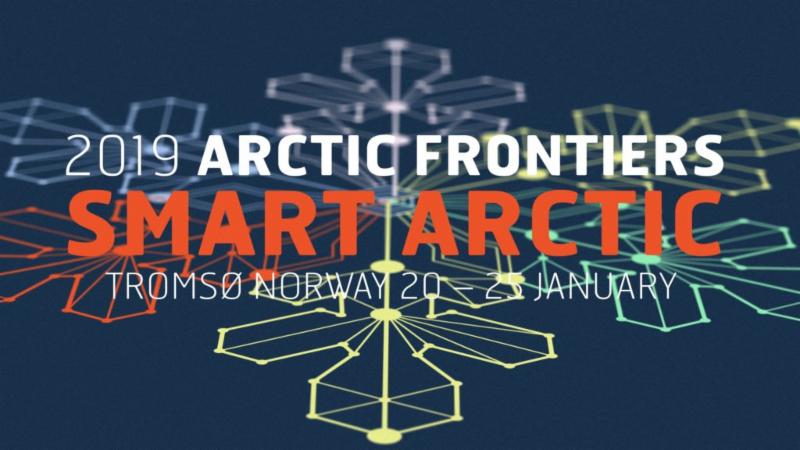
Arctic Frontiers, January 20-25, 2019 (Tromso, Norway). The Arctic Frontiers is a global scientific conference on economic, societal, and environmental sustainable growth. This year's theme will be "Smart Arctic," with a pan-arctic emphasis, and an effort to build new partnerships across nations, generations and ethnic groups. Arctic Frontiers provides a forum for dialogue and communication between science, government and industry. The plenary program will have five main sessions: State of the Arctic, Blue Growth, Smart Solutions, Bridging the Gap, and Arctic business prospects. An abstract-driven science program will address Plastics in the Ocean, the Future of Governance and Handling Vulnerability in Arctic Ecosystems, State of the Arctic and A Smart Arctic Future.
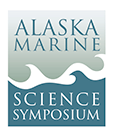 ** New this week ** Alaska Marine Science Symposium, January 28 - Feb. 1 (Anchorage, AK). For over 20 years, Alaska's premier marine research conference brings together scientists, educators, resource managers, students, and interested public to discuss the latest marine research being conducted in Alaskan waters. About 700 people are expected to attend this 4-day long, annual conference. Each day of the conference highlights Alaskan marine ecosystems: Gulf of Alaska (Tuesday), Bering Sea & Aleutian Islands (Wednesday), and the Arctic (Thursday). Research topics discussed range from ocean physics, fishes and invertebrates, seabirds, marine mammals, to local traditional knowledge. Since its inception, NPRB has been a proud sponsor and one of the leading organizers of AMSS. USARC is a co-sponsor of this event.
One relevant session at the AAAS annual meeting.
Arctic sciences are at the forefront of discovery resulting from research that engages indigenous knowledge and connects to policy decisions about the region. This session brings together speakers from various disciplines representing multiple organizations to discuss recent achievements in Arctic sciences with respect to fundamental and policy-focused interdisciplinary and international research. Topics to be addressed include examples of Arctic-based research that crosses regional and disciplinary boundaries, and the key methodological strengths of this research, as well as how Arctic-based research could contribute to disciplines and research in other regions, and the role of funding agencies in advancing this exchange.
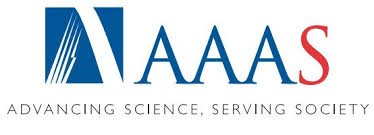 ** New this week ** Three Arctic-themed talks in the session "Science in the New Arctic: The Converging of Natural and Social Sciences," organized by Andrey Petrov and Jack Kaye, moderated by Jessica Graybill, and with John Farrell as Discussant. The talks are "Indigenous Knowledge and Interdisciplinary Science in the Arctic" (Carolina Behe), "Towards Knowledge Co-production in the Arctic" (Dmitry Streletskiy) and "Enhancing International Research in the Arctic" (Paul Berkson).
 of the AAG includes over 8,500 geographers converging from the U.S., Canada, and nearly 60 other countries in a typical year including geographers, GIS specialists, environmental scientists, and other leaders for the latest in research and applications in geography, sustainability, and GIScience. of the AAG includes over 8,500 geographers converging from the U.S., Canada, and nearly 60 other countries in a typical year including geographers, GIS specialists, environmental scientists, and other leaders for the latest in research and applications in geography, sustainability, and GIScience.
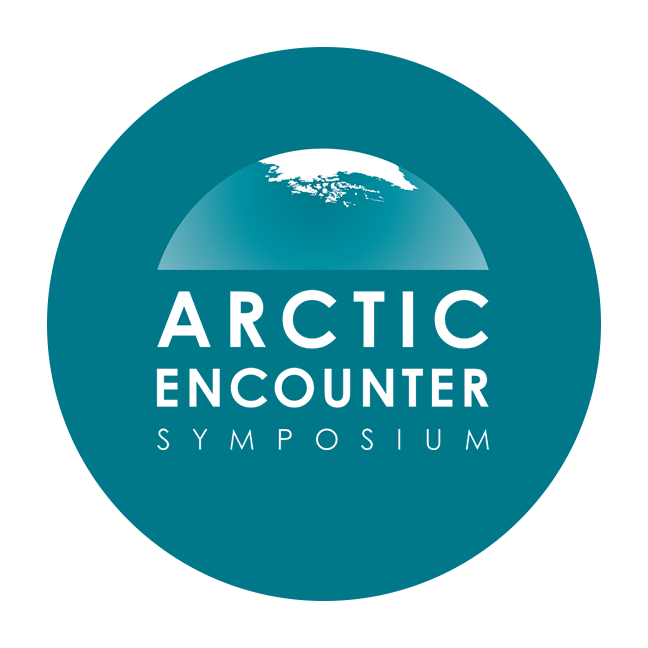 The 6th Annual Arctic Encounter Seattle, April 25-26, 2019 (Seattle, WA, USA). The sixth annual Arctic Encounter Seattle will engage the topic of innovation in the Arctic, specifically disruptive business and investment models, energy and power, climate research, national security, new economic and trade models, and popular media and awareness movements impacting the Far North. The 2018 Arctic Encounter Seattle drew over 300 participants from across Alaska, the U.S., and the world, including over 100 speakers, 32 sponsors, 11 media partners, fashion and photography installations, a live permafrost exhibition, 13 guest performers, fashion designers, and artist exhibitors to the downtown Seattle waterfront at Pier 66. The 2019 Arctic Encounter Seattle expects to increase engagement in new sectors and engage participants through policy debates, research presentations, performances, and more. The two-day Arctic Encounter Seattle will include an opening reception, two continental breakfasts, two keynote luncheons, a networking reception with Alaskan glacier ice cocktails, and a seated three course dinner including keynotes and live musical entertainment from the Far North. The Arctic Encounter is the largest annual Arctic policy and business conference convening in the United States, with partnerships and convening efforts worldwide. The 6th Annual Arctic Encounter Seattle, April 25-26, 2019 (Seattle, WA, USA). The sixth annual Arctic Encounter Seattle will engage the topic of innovation in the Arctic, specifically disruptive business and investment models, energy and power, climate research, national security, new economic and trade models, and popular media and awareness movements impacting the Far North. The 2018 Arctic Encounter Seattle drew over 300 participants from across Alaska, the U.S., and the world, including over 100 speakers, 32 sponsors, 11 media partners, fashion and photography installations, a live permafrost exhibition, 13 guest performers, fashion designers, and artist exhibitors to the downtown Seattle waterfront at Pier 66. The 2019 Arctic Encounter Seattle expects to increase engagement in new sectors and engage participants through policy debates, research presentations, performances, and more. The two-day Arctic Encounter Seattle will include an opening reception, two continental breakfasts, two keynote luncheons, a networking reception with Alaskan glacier ice cocktails, and a seated three course dinner including keynotes and live musical entertainment from the Far North. The Arctic Encounter is the largest annual Arctic policy and business conference convening in the United States, with partnerships and convening efforts worldwide.
Save the Date! 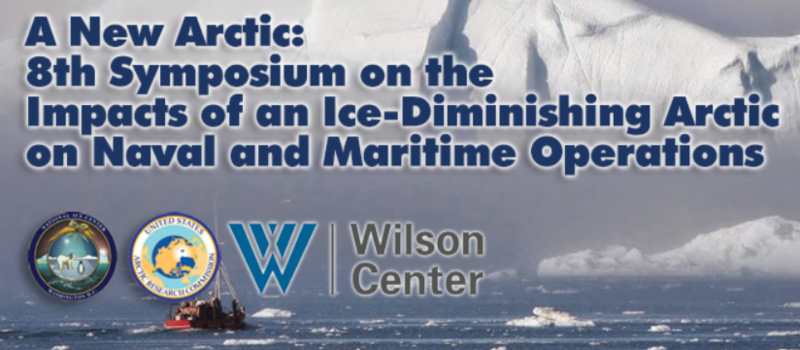
Mark your calendars to attend IDA-8, which some have called one of the best Arctic gatherings around. Historically, this biennial symposium was co-hosted by U.S. National/Naval Ice Center (NIC) and the US Arctic Research Commission (USARC). In 2019, these partners will join forces with the preeminent Wilson Center's Polar Institute, as a third co-host. The now 2-day symposium will be held in the Ronald Reagan Building Amphitheater, in Washington, DC. The event will focus on a broad cross-section of naval and maritime operations and issues in an ice-diminishing Arctic. The symposium brings together nationally and internationally recognized experts on Arctic governance, geopolitics, marine operations, infrastructure, science, and environmental observations, from the local, regional, and pan-Arctic scale. Information on prior symposia, including lists of speakers, video clips, and copies of presentations, is available here. Attendance is free, and registration will begin in Spring 2019. The event will be webcast live, and video recorded.
|
|

  
4350 N. Fairfax Drive, Suite 510
Arlington, VA 22203, USA
External links in this publication, and on the USARC's World Wide Web site ( www.arctic.gov) do not constitute endorsement by the US Arctic Research Commission of external Web sites or the information, products or services contained therein. For other than authorized activities, the USARC does not exercise any editorial control over the information you may find at these locations. These links are provided consistent with the stated purpose of this newsletter and the USARC Web site.
|
|
|
|
|
|
|
|
|